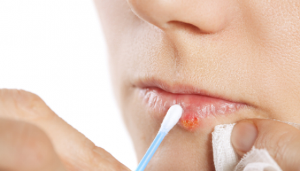
Fever blisters, also known as cold sores, are a disease caused by infection with the virus Herpes Simplex type 1 (or occasionally Herpes Simplex type 2). The symptoms are an outbreak of blisters on the skin on or around the mouth, which break open and form sores weeping a colorless fluid full of live virus. The sores form a scab-
After the outbreak, the virus retreats into the nerves of the skin and becomes dormant. No symptoms occur during the dormant phase and the disease is much less contagious although transmission is still possible. There is no cure for cold sores and no cases of spontaneous remission without recurrence have been observed. People infected with herpes may have anywhere from no outbreaks to as many as four or five in a year.
Although there is as yet no cure for cold sores, there are treatments that may shorten an outbreak by a few days, and other things that can alleviate the symptoms to a degree or help to reduce the chance of infection.
Antiviral Treatments
Antiviral drugs that are used to treat cold sores include Zovirax (acyclovir), Famvir (famciclovir), and Valtrex (valacyclovir). These medications are taken orally and should be started within the first 48 hours of the outbreak, that is, before blisters appear. Often the outbreak will signal itself with itching, pain, and swelling of the tissues where the blisters will appear afterwards. Use of antiviral medications
early will not stop the outbreak from proceeding but has been shown to reduce the duration by one to three days, and to reduce the severity of the outbreak as well.
Topical antiviral medications to treat cold sores are available over the counter and have also been shown to have roughly the same effectiveness. As with the oral antivirals, topical treatments should be used at the first appearance of symptoms.
Pain Relief
There are many treatments both commercially available and of the home remedy variety that can help reduce the discomfort caused by cold sores. These treatments will not shorten the outbreak but may help make it more bearable. Medications appropriate to the illness are usually topical rather than oral analgesics. Look for ointments with a numbing agent such as phenol or menthol.
Ice applied to the sores can also help reduce the discomfort from the cold sores. Ice should be wrapped in cloth rather than applied to the sores directly.
There is some evidence that salt applied to cold sores can kill the viruses and reduce the outbreak’s severity. However, applying salt to open sores is not a painless procedure, so if you attempt this, do so with the understanding that it will hurt.
Prevention Of Infection
Outbreaks of cold sores are associated with a compromised immune system once infection has occurred. Thus, anything that can help boost the immune system (a good diet, regular exercise, avoiding colds and flu, vitamin C) will help to reduce the frequency of cold sore outbreaks.
To avoid giving the disease to someone else or spreading it to other parts of the face or body, good hygiene practices are the best approach.
Avoid touching the cold sores. Wash your hands frequently during an outbreak. Covering the open sores with bandages or ointments may help prevent spreading of the fluids that come from the sores.
